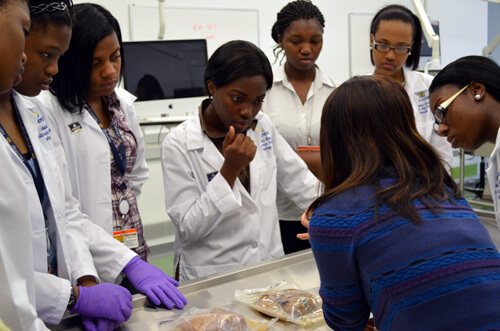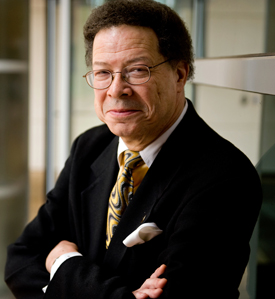
Every summer, medical researchers and faculty at the National Institute on Aging and National Institute on Drug Abuse, as well as several Johns Hopkins University programs on the Johns Hopkins Bayview campus, host approximately 300 students. The Summer Scholars program aims to increase diversity in academic medicine and science, enrich the programs that we currently have, broaden the applicant pool for all campus-based programs and strengthen the future financial foundation for these initiatives through partnering and attracting new external support.
The Summer Scholars aims to serve as a national model to increase diversity within academic medicine.
Summer Scholars Programs
-
Since 2005, the Department of Neurology has hosted the Johns Hopkins Internship in Brain Sciences Program, an eight-week summer workplace mentoring program that targets high-achieving, under-represented minority high school juniors and seniors from schools in Baltimore City and the surrounding metropolitan area, with an interest in science or medicine. During these eight weeks, an average of 10-20 selected interns conduct a clinical or basic science research project, attend neurology and psychiatry clinics, and are exposed to career enrichment seminars including sessions with successful Johns Hopkins minority faculty members.
Read more about the program or e-mail Amanda Brown, Ph.D., at [email protected].
-
The Division of Geriatric Medicine and Gerontology hosts a summer program for medical students between their first and second year to expose them to geriatric medicine and research. The ultimate aim of this initiative is to recruit students to academic medicine; specifically to aging research and geriatric medicine. The eight-week program is funded by a NIA T35 grant.
The focus of the program is to provide the student with intense research experience with a research mentor. Each student will meet regularly with a mentor and complete a summer research project that typically results in a presentation at a national meeting during the second year of medical school (and sometimes a published manuscript). The experience includes research training seminars, as well as clinical experiences, geriatric medicine lectures and ethnogeriatrics conferences, which expose students to a broad array of geriatric services and topics.
Read more and apply online, or e-mail Lindia Holmes at [email protected].
-
This summer, a group of 35 Baltimore high school students in the MERIT Health Leadership Academy will shadow professionals in various departments across Johns Hopkins medical campuses. As rising juniors, MERIT scholars participate in clinical internships, giving them the opportunity to experience health care in the real world. MERIT scholars shadow up to 20 different health care providers in a variety of settings, including intensive care, pediatrics, outpatient clinics, surgery and more. These internships provide broad career exposure and hands-on experience for aspiring health professionals and deepen their understanding of what it means to be a health care leader.
By providing support and opportunities to students underrepresented in medicine, MERIT is changing the face of health care, one scholar at a time while increasing diversity among the next generation of health professionals in Baltimore. MERIT scholars take advanced academic classes and SAT prep on Saturdays, work in hospitals, labs, and community organizations during paid internships and receive long-term mentorship. MERIT scholars have benefited immensely from the tireless support of the Johns Hopkins community, who graciously serve as mentors, provide internship opportunities and volunteer as guest speakers and instructors.
Learn more about the exciting work of MERIT and its scholars.
-
The National Institutes of Health / National Institute on Aging (NIH/NIA) Summer Internship Program in Biomedical Research offers hands-on experience and a unique opportunity for high school, college, graduate and medical students to develop skills in scientific research. For more information, visit NIA Summer Internship Programs: Application is Now Open.
Summer internships generally last from eight to ten weeks, beginning in late May and ending in mid-to-late August. Some flexibility exists to accommodate individual student needs.
If you have any questions about the Summer Internship Program or the application process, contact Arlene P. Jackson, NIA Summer Program Coordinator at 410-558-8121 or [email protected]
-
The National Institutes of Health / National Institute on Drug Abuse (NIH/NIDA) Summer Internship Program in Biomedical Research offers hands-on experience and a unique opportunity for high school, college, graduate and medical students to develop skills in scientific research.
Summer internships generally last from eight to ten weeks, beginning in June and ending in August. Some flexibility exists to accommodate individual student needs.
For more information , visit NIDA Summer Research Internship Program.
-
The Division of Pulmonary and Critical Care Medicine hosts undergraduate students each summer as part of an NIH-funded program to enhance diversity in biomedical sciences. Students from around the United States and Puerto Rico join faculty for a ten-week, research-focused experience that extends from Memorial Day weekend through the first week of August.
Students are matched with mentors based on their interests. Students work on specific research projects under the supervision of their mentor. Projects span a broad range of research, from the basic science of endothelial or epithelial cell biology to asthma epidemiology.
In addition to the research experience, students participate in a weekly journal club, during which they present primary research articles to their peers and members of the faculty. Students also attend a seminar series featuring faculty members from Johns Hopkins and the NIH. This forum provides students with the opportunity to interact with faculty members and hear different perspectives on issues related to career development. Students interested in clinical medicine are given the opportunity to “round” with the Johns Hopkins Medicine residents, providing a glimpse of life in clinical medicine as a resident at an academic institution.
At the end of the summer, students present their work in a poster session.
For more information, visit Student Training Program.
-
The Recruitment and Training Program (RTURP) for Under-Represented Populations supports a series of special initiatives designed to have a broad, yet integrated influence on reducing the burden of drug abuse among minorities and other traditionally under-represented populations.
The program is designed to address the special needs of ethnic and other under-served segments of the population, and align with NIH’s strategic plan to improve diversity and increase the number of minorities conducting research.
For more information or to apply, visit www.training.nih.gov/ or irp.drugabuse.gov/rtpup.php, or contact Christie Brannock at [email protected].
Annual Levi Watkins, Jr. M.D. Lectureship

Every year, over 300 students are welcomed to the Johns Hopkins Bayview campus for the Summer Scholars Program, a partnership among the National Institute on Aging, National Institute on Drug Abuse and Johns Hopkins University School of Medicine. Researchers and faculty from these programs recruit underrepresented minority students and those from underprivileged backgrounds with the goal of increasing diversity in academic medicine and science. To celebrate these students, Johns Hopkins Bayview hosts an annual lectureship, named in honor of Levi Watkins Jr., M.D., a leader in the field of cardiothoracic surgery who worked to enhance the culture of diversity and inclusion at Johns Hopkins. He was a tireless advocate for fairness and diversity, spearheading a drive to recruit minorities to Hopkins and establishing the annual Martin Luther King Jr. Commemoration.
Previous keynote speakers have included:
- Renee Blanding, M.D., Johns Hopkins Bayview Medical Center
- Marie Bernard, M.D., National Institute on Aging
- Freeman A. Hrabowski, III, Ph.D., University of Maryland-Baltimore County
- Alfredo Quiñones-Hinojosa, M.D., Johns Hopkins University School of Medicine
- Jean Lud Cadet, M.D., National Institute on Drug Abuse
- Levi Watkins, Jr., M.D., Johns Hopkins University School of Medicine
- Lisa D. Cooper, M.D., MPH, Johns Hopkins University School of Medicine
- Crystal C. Watkins, M.D., Ph.D., Sheppard Pratt Health System
- Nadia Hansel, M.D., Johns Hopkins University School of Medicine
- Michele Evans, M.D., National Institute on Aging
- Ivan Montoya, M.D., National Institute on Drug Abuse